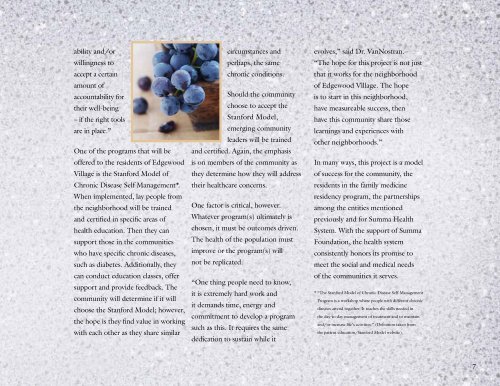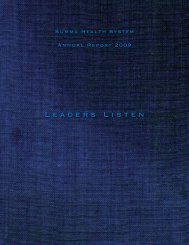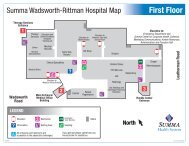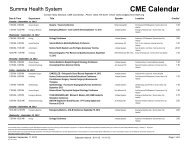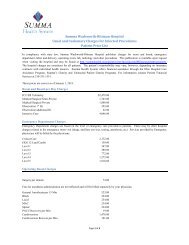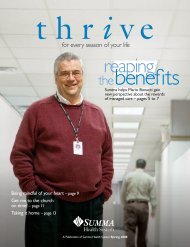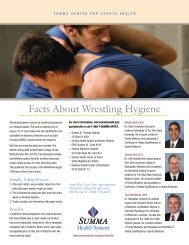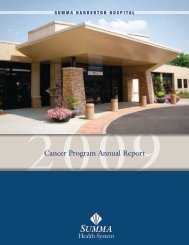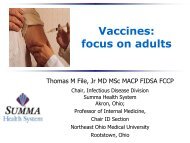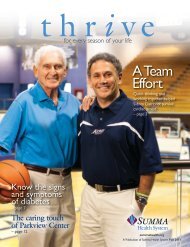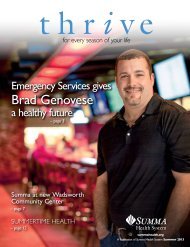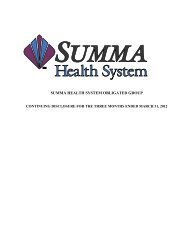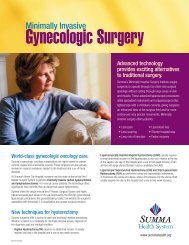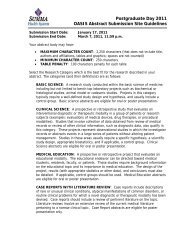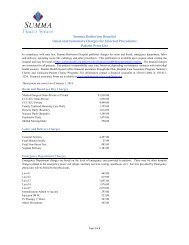2011 Annual Report - Summa Health System
2011 Annual Report - Summa Health System
2011 Annual Report - Summa Health System
You also want an ePaper? Increase the reach of your titles
YUMPU automatically turns print PDFs into web optimized ePapers that Google loves.
ability and/or<br />
willingness to<br />
accept a certain<br />
amount of<br />
accountability for<br />
their well-being<br />
– if the right tools<br />
are in place.”<br />
One of the programs that will be<br />
offered to the residents of Edgewood<br />
Village is the Stanford Model of<br />
Chronic Disease Self Management*.<br />
When implemented, lay people from<br />
the neighborhood will be trained<br />
and certified in specific areas of<br />
health education. Then they can<br />
support those in the communities<br />
who have specific chronic diseases,<br />
such as diabetes. Additionally, they<br />
can conduct education classes, offer<br />
support and provide feedback. The<br />
community will determine if it will<br />
choose the Stanford Model; however,<br />
the hope is they find value in working<br />
with each other as they share similar<br />
circumstances and<br />
perhaps, the same<br />
chronic conditions.<br />
Should the community<br />
choose to accept the<br />
Stanford Model,<br />
emerging community<br />
leaders will be trained<br />
and certified. Again, the emphasis<br />
is on members of the community as<br />
they determine how they will address<br />
their healthcare concerns.<br />
One factor is critical, however.<br />
Whatever program(s) ultimately is<br />
chosen, it must be outcomes driven.<br />
The health of the population must<br />
improve or the program(s) will<br />
not be replicated.<br />
“One thing people need to know,<br />
it is extremely hard work and<br />
it demands time, energy and<br />
commitment to develop a program<br />
such as this. It requires the same<br />
dedication to sustain while it<br />
evolves,” said Dr. VanNostran.<br />
“The hope for this project is not just<br />
that it works for the neighborhood<br />
of Edgewood Village. The hope<br />
is to start in this neighborhood,<br />
have measureable success, then<br />
have this community share those<br />
learnings and experiences with<br />
other neighborhoods.”<br />
In many ways, this project is a model<br />
of success for the community, the<br />
residents in the family medicine<br />
residency program, the partnerships<br />
among the entities mentioned<br />
previously and for <strong>Summa</strong> <strong>Health</strong><br />
<strong>System</strong>. With the support of <strong>Summa</strong><br />
Foundation, the health system<br />
consistently honors its promise to<br />
meet the social and medical needs<br />
of the communities it serves.<br />
* “The Stanford Model of Chronic Disease Self-Management<br />
Program is a workshop where people with different chronic<br />
diseases attend together. It teaches the skills needed in<br />
the day-to-day management of treatment and to maintain<br />
and/or increase life’s activities.” (Definition taken from<br />
the patient education/Stanford Model website).<br />
7


